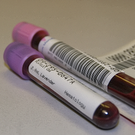
Results from a recently completed Phase 3 trial suggest that thalidomide may delay disease progression in patients with smoldering myeloma.
Specifically, patients in the trial who received thalidomide in combination with Zometa had a noticeably longer time to disease progression than patients who received Zometa alone.
Over a third of the patients who received thalidomide and Zometa also showed a tumor response, whereas none of the patients treated with Zometa alone had such a response.
However, more patients who received …
Read the full story »

Results from a recent retrospective study suggest that smoldering myeloma patients with a high percentage of plasma cells in the blood are more likely to progress to active myeloma within two years of diagnosis, as compared to patients with a lower percentage of plasma cells.
Patients with more than 5 billion plasma cells per liter of blood or more than 5 percent of their blood cells in the blood being plasma cells were defined as having a ‘high percentage’ of …
Read the full story »
Subcutaneous Velcade Receives Approval In Europe For Multiple Myeloma – Janssen-Cilag, the company that markets Velcade (bortezomib) in Europe, announced on Friday that the European Medicines Agency has granted marketing authorization of subcutaneous Velcade. The decision was based on results of a Phase 3 study demonstrating that subcutaneous Velcade is as effective as intravenous Velcade but associated with fewer and less serious side effects. Europe is the third region where subcutaneous Velcade is now available; both the U.S. Food …
Read the full story »

Brenda Driver, a 59-year old former nurse from California, was diagnosed with monoclonal gammopathy of undetermined significance (MGUS) in August last year.
She took the diagnosis as a blessing in disguise. “I’m grateful that I didn’t present with myeloma right away. Having MGUS gives me a chance to learn about myeloma,” she said.
MGUS is a plasma cell disorder, characterized by the presence of increased levels of monoclonal (M) protein in the blood. Unlike myeloma patients, however, those with MGUS …
Read the full story »

Results from a recent retrospective study suggest that blood tests may be sufficient, and that urine tests and skeletal surveys may not be necessary, to detect most cases of relapse or disease progression after stem cell transplantation for multiple myeloma.
However, the investigators point out that patients who show clinical signs of relapse/progression, such as such kidney problems or bone lesions, after stem cell transplantation may need additional types of testing, since they tend to have poorer prognoses.
The investigators …
Read the full story »

Results from a recent Italian study confirm that smoldering myeloma patients with at least 60 percent of the cells in their bone marrow being plasma cells are 5.6 times more likely than others to progress to symptomatic multiple myeloma.
In addition, the findings indicate that bone marrow aspiration may be a better tool than bone marrow biopsy for predicting rapid progression from smoldering to active myeloma.
The study investigators suggest that smoldering myeloma patients with at least 60 percent plasma …
Read the full story »

Results from a Spanish Phase 3 clinical trial suggest that initial treatment with a combination of Velcade, thalidomide, and dexamethasone may lead to better responses before and after stem cell transplantation, as compared to treatment with thalidomide and dexamethasone alone. In addition, treatment with the three-drug combination increases progression-free survival time.
The study investigators concluded that their findings support the use of a combination of Velcade (bortezomib), thalidomide (Thalomid), and dexamethasone (Decadron), often referred to as VTD, …
Read the full story »
